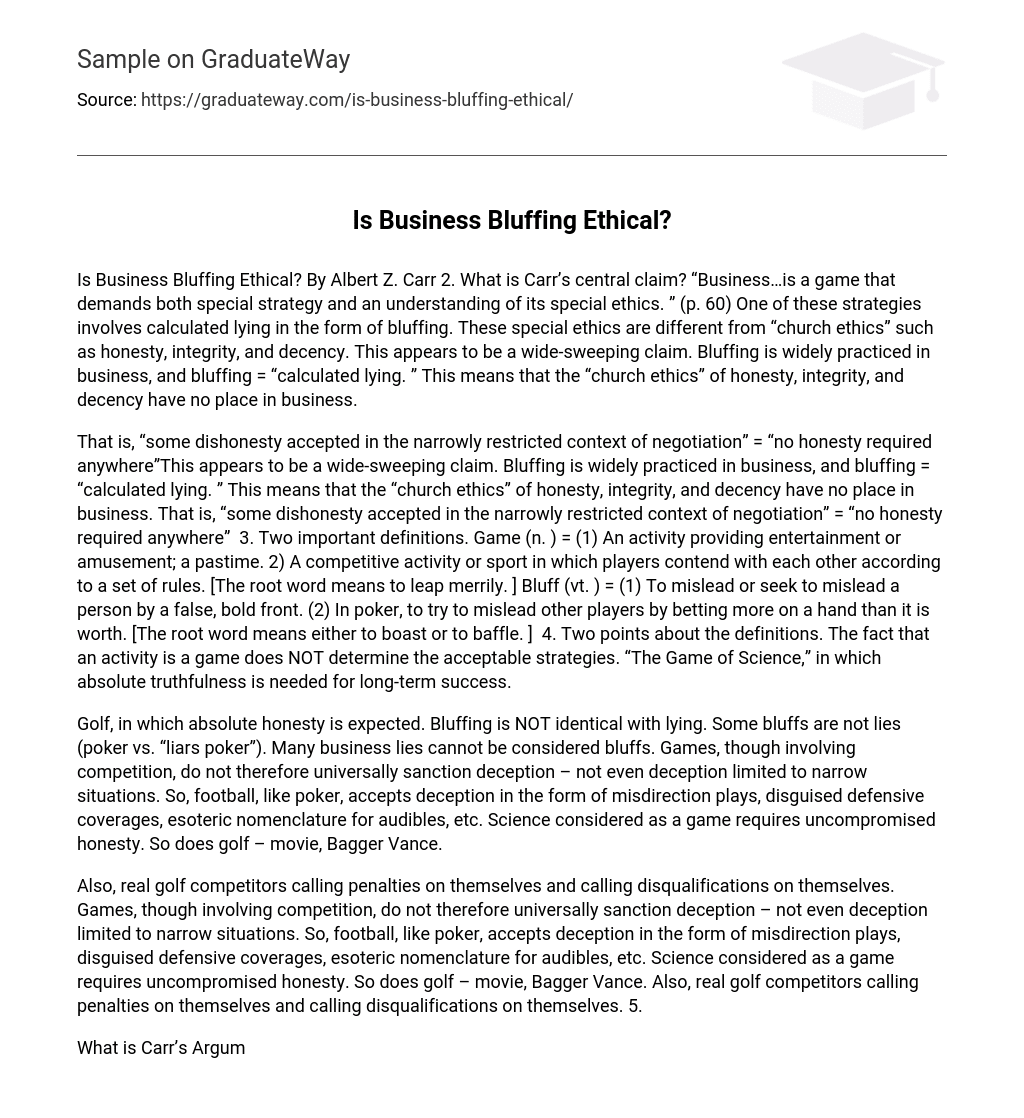What is Carr’s central claim? “Business…is a game that demands both special strategy and an understanding of its special ethics. ” (p. 60) One of these strategies involves calculated lying in the form of bluffing. These special ethics are different from “church ethics” such as honesty, integrity, and decency. This appears to be a wide-sweeping claim. Bluffing is widely practiced in business, and bluffing “calculated lying. ” This means that the “church ethics” of honesty, integrity, and decency have no place in business.
That is, “some dishonesty accepted in the narrowly restricted context of negotiation” “no honesty required anywhere”This appears to be a wide-sweeping claim. Bluffing is widely practiced in business, and bluffing “calculated lying. ” This means that the “church ethics” of honesty, integrity, and decency have no place in business. That is, “some dishonesty accepted in the narrowly restricted context of negotiation” “no honesty required anywhere”
Two points about the definitions. The fact that an activity is a game does NOT determine the acceptable strategies. “The Game of Science,” in which absolute truthfulness is needed for long-term success. Golf, in which absolute honesty is expected. Bluffing is NOT identical with lying. Some bluffs are not lies (poker vs. “liars poker”). Many business lies cannot be considered bluffs. Games, though involving competition, do not therefore universally sanction deception – not even deception limited to narrow situations. So, football, like poker, accepts deception in the form of misdirection plays, disguised defensive coverages, esoteric nomenclature for audibles, etc. Science considered as a game requires uncompromised honesty. So does golf – movie, Bagger Vance.
Also, real golf competitors calling penalties on themselves and calling disqualifications on themselves. Games, though involving competition, do not therefore universally sanction deception – not even deception limited to narrow situations. So, football, like poker, accepts deception in the form of misdirection plays, disguised defensive coverages, esoteric nomenclature for audibles, etc. Science considered as a game requires uncompromised honesty. So does golf – movie, Bagger Vance. Also, real golf competitors calling penalties on themselves and calling disqualifications on themselves.
What is Carr’s Argument? “Falsehood ceases to be falsehood when it is understood on all sides that the truth is not expected to be spoken. ” (p. 59) Is business a game in which the players do NOT expect truth to be spoken anywhere? So, where do the ‘rules of the game’ require truth to be spoken?
What is Carr’s argument? Poker and business share a particular brand of ethics. Poker not only rewards cunning deception (that is, bluffing), but it also celebrates it. Is this true of business? No one thinks the worse of poker players for taking advantage of people by bluffing. But what of the other examples of taking advantage that Carr lists on p. 61? Ultimately, Carr offers us an analogy, not an argument. He says that business is like poker. And he offers some points of analogy – both can be viewed as competitive games played according to a set of rules. — both permit instances when players do not have to be completely honest, that is, tell all of the truth and nothing but the truth. In poker this is bluffing. In business this is negotiation (at least certain types). E. g, my school board experience re salaries.
But, there are also disanalogies – business certainly is not identical with poker. So, how much that is true about poker can be carried over into business? What is Carr’s independent evidence/argument that lying is OK in business? Ultimately, Carr offers us an analogy, not an argument. He says that business is like poker. And he offers some points of analogy – both can be viewed as competitive games played according to a set of rules. both permit instances when players do not have to be completely honest, that is, tell all of the truth and nothing but the truth.





